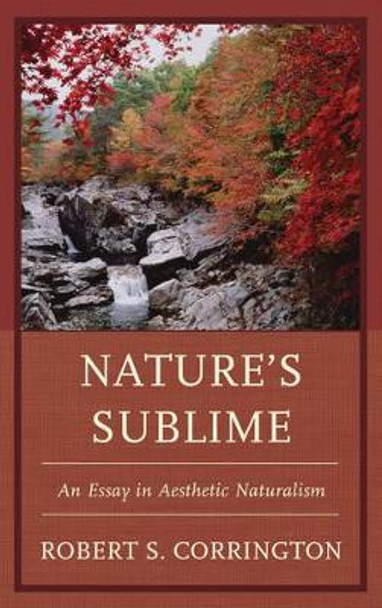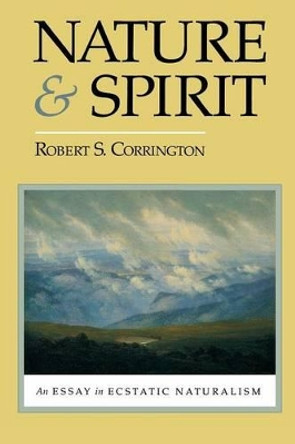Description
About the Author
Robert S. Corrington is professor of philosophical theology in the graduate division of religion at Drew University, Madison, NJ. He has published nine previous books as an ongoing project of creating and expanding the philosophical and theological perspective of his ecstatic naturalism. From the beginning his work has been concerned with bringing classical American philosophy into dialogue with Continental thought. As important is his commitment to Post-Freudian psychoanalysis and its correlation to semiotics and metaphysics. He has served on the Boards of the Semiotic Society of America and the Highlands Institute and as president of the Karl Jaspers Society of North America.
Reviews
In order to deliver its central thesis, this book traverses a wide scope of intellectual history-from continental philosophy to classical American to the psychoanalytic theories of Freud, Reich, Kohut, Jung, Rank, and Kristeva. Corrington contrasts communities that actively suppress and reject novel forms of semiosis and artistic creation with those communities of interpretation that welcome creative and enriched signs and symbols. ... the book makes particularly cogent contributions on the topic of religion and violence. * Religious Studies Review *
"The regions of self, community, religion, and nature...are present. But each of these themes are radically recast within an aesthetic approach in mind. The aesthetics that Corrington is interpreting here is one which takes the sublime as its key motif. The sublime, we are told, reveals what is most essential about natura naturans ('nature naturing') and its relationship to 'the human process,' a Buchlerian term designating a 'self' as creative agent in process. The split between nature naturing and nature natured is then taken up with the sublime in mind, and how the human being (or 'human process') relates psychoanalytically and semiotically to the sublime. This is the culminating theme of the book. Overall, those interested in American philosophy and theology, continental philosophy of religion, German idealism and romanticist aesthetics will appreciate this book because it takes on a very unique approach to thinking about religion through art. * Analecta Hermeneutica *
[I]n Nature's Sublime, Corrington has crafted ordinal metaphysics, phenomenology, and psychoanalysis with aesthetics into a four-legged stool - remove one leg, and it may wobble but may still support an inquiry into the possibilities of grace in our time.... Moral in its imperative, aesthetic in its ultimacy, Nature's Sublime offers prescriptions for an Art of Life that may redeem our often mundane times. * The Pluralist *
Robert Corrington continues to refine, develop, and clarify his vision of religious-or what he now prefers to call aesthetic-naturalism. The book's broad scope includes, among other things, presentation of an ordinal phenomenological metaphysics that contrasts with the phenomenologies of Husserl and Heidegger; analysis of closed and open types of semiotic communities and their respective stultifying and beneficent social effects; description of intrusions of the spirit that supplement the results of biological evolution and stem from the unconscious of nature upwelling into the human unconscious; and defense of the bold thesis that religion can become deeply ethical only when it surpasses itself and becomes sublated into the domain of aesthetic experience, creation, and life-especially to the extent that the aesthetic opens the way to the awesomely disturbing but also healing powers of the sublime. The richly innovative, provocative, and debatable character of Corrington's claims and arguments in relation to these and other topics will stimulate lively thought and discussion. -- Donald A. Crosby, Colorado State University
Robert S. Corrington's tenth book, Nature's Sublime: An Essay in Aesthetic Naturalism, marks a major shift in Corringtonian thought to a new, third phase. The major claim of this book is that religion, given its ordinal complexity, is prone to tribalization, moreso than the aesthetic which is its foundation. Expanding upon the Schellingean thesis that art is to crown theology, Corrington links "god-ing" with aesthetic fulfillment, to a sublime that "lives on the other side of all religious revelations with their limiting and limited tribal content." Thus the encounter with art and the sublime is the culminating point of any individuating process - whether personal or communal. This is not to say that religion or theology no longer has any place for Corrington. Instead, within art, Corrington claims, lives the supernatural, understood as the "deeply natural." -- Leon Niemoczynski, Immaculata University
Robert Corrington has sifted his earlier philosophical work of ecstatic naturalism through a new aesthetic sieve with the help of Kant, Reich and Sri Aurobindo among other diverse thinkers. For readers new to Corringtons work the first chapters of the book will serve as a helpful induction to his unique perspective. Those already familiar with his work will find new and exciting angles from which to ponder his complex system of semiotics, psychoanalysis, naturalism, aesthetics and religious experience from the standpoint of ordinal phenomenology. Natures Sublime is a rare treat indeed, an important landmark in Corringtons intellectual journey. -- Sigridur Gudmarsdottir, University of Iceland
Book Information
ISBN 9781498510882
Author Robert S. Corrington
Format Paperback
Page Count 230
Imprint Lexington Books
Publisher Lexington Books
Weight(grams) 345g
Dimensions(mm) 226mm * 154mm * 18mm







